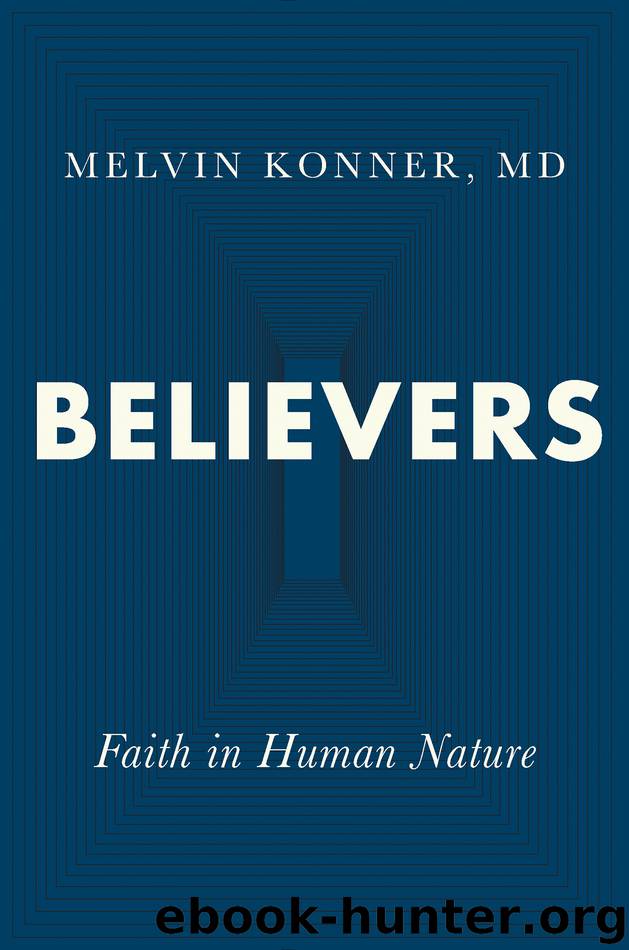Believers by Melvin Konner

Author:Melvin Konner
Language: eng
Format: epub
Publisher: W. W. Norton & Company
Published: 2019-06-23T16:00:00+00:00
IN UNWEAVING THE RAINBOW, Richard Dawkins recalls “trying gently to amuse a six-year-old child at Christmas time by reckoning up with her how long it would take Father Christmas to go down all the chimneys in the world.” He proceeded with the calculation—100 million houses with children, each chimney 20 feet long, the time taken to tiptoe. “She saw the point and realized that there was a problem, but it didn’t worry her in the least. . . . The obvious possibility that her parents had been telling falsehoods never seemed to cross her mind.” Yet, says Dawkins, “the years of childhood innocence may pass too soon. I love my parents for taking me for a ride, high as a kite, through the treetops; for telling me about the Tooth Fairy and Father Christmas, about Merlin and his spells, about baby Jesus and the Three Wise Men,” making childhood “a time of enchantment.” Dawkins has no use, though, for any beliefs about the supernatural after childhood.
A normal 6-year-old, such as the one he reckoned chimneys with, is entering Piaget’s stage of concrete operations, so it is not surprising that she sees the implications of the reckoning; she just doesn’t care. It’s not because she is bamboozled by her parents’ falsehoods; it’s because she wants the enchantment. As Cristine Legare found, many children never outgrow the supernatural, maintaining scientific and supernatural beliefs in one and the same mind. But they do outgrow Santa Claus and the tooth fairy. How? And why, for so many, is it different from the story of baby Jesus?
One thing of note is that Dawkins’s young friend was probably about to lose her belief in Father Christmas. A classic study of 4-, 6-, and 8-year-olds found that 85, 65, and 25 percent, respectively, believed in Santa. For the Easter bunny the percentages were similar, while for the tooth fairy more 6-and 8-year-olds (60 percent) than 4-year-olds (20 percent) believed, probably because of the age of tooth loss. Firm disbelief rose with age for all three groups: most for the Easter bunny (15, 20, and 60 percent at 4, 6, and 8), next for the tooth fairy (5, 20, and 35 percent), and least for Santa (5, 10, and 20 percent).
But, really intriguingly, fully 55 percent of 8-year-olds were rated as transitional for Santa, as opposed to 5 percent for the Easter bunny and none for the tooth fairy. Why? Well, Santa Claus is a far more high-stakes cultural item for parents, communities, even economies. Parents “organize” their kids’ belief in Santa much more actively, colluding with them. Some parents say that they believe in Santa Claus, and many express sadness when their children stop believing. The history of Santa Claus suggests a growing commitment to him even as religion has declined.
My wife, developmental psychologist Ann Cale Kruger, has said,
I can still feel the excitement and the intimacy and the wonder of there being someone who knows my wishes, who works all year not just for me but for all children.
Download
This site does not store any files on its server. We only index and link to content provided by other sites. Please contact the content providers to delete copyright contents if any and email us, we'll remove relevant links or contents immediately.
The Lost Art of Listening by Michael P. Nichols(7506)
Why I Am Not A Calvinist by Dr. Peter S. Ruckman(4153)
The Rosicrucians by Christopher McIntosh(3519)
Wicca: a guide for the solitary practitioner by Scott Cunningham(3177)
Signature in the Cell: DNA and the Evidence for Intelligent Design by Stephen C. Meyer(3138)
Real Sex by Lauren F. Winner(3022)
The Holy Spirit by Billy Graham(2952)
To Light a Sacred Flame by Silver RavenWolf(2823)
The End of Faith by Sam Harris(2741)
The Gnostic Gospels by Pagels Elaine(2530)
Waking Up by Sam Harris(2459)
Nine Parts of Desire by Geraldine Brooks(2368)
Jesus by Paul Johnson(2360)
Devil, The by Almond Philip C(2331)
The God delusion by Richard Dawkins(2308)
Heavens on Earth by Michael Shermer(2284)
Kundalini by Gopi Krishna(2184)
Chosen by God by R. C. Sproul(2164)
The Nature of Consciousness by Rupert Spira(2108)
